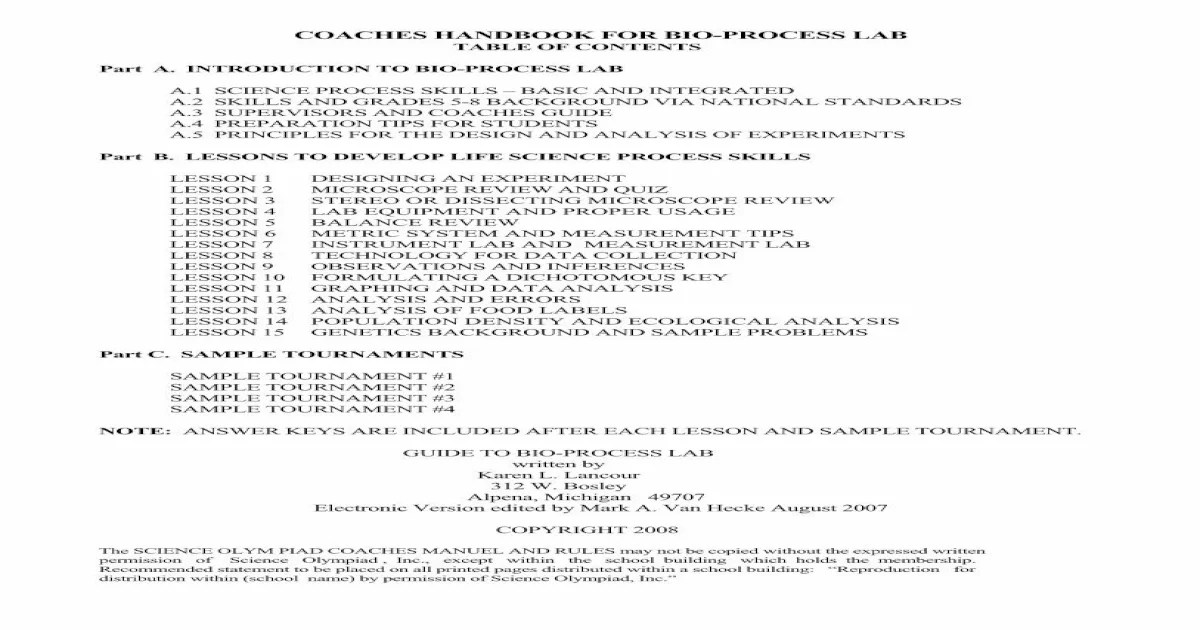The Science Olympiad Bio Process Lab is an exciting and challenging event that tests students’ knowledge and skills in biology. This lab provides an opportunity for students to apply their understanding of biological processes to real-world problems. In this guide, we will explore the purpose, format, and essential techniques used in the Science Olympiad Bio Process Lab.
We will also provide guidance on how to prepare for the event and share examples of experiments that have been conducted in the past.
The Science Olympiad Bio Process Lab is a valuable learning experience for students who are interested in pursuing a career in biology. The lab helps students develop their critical thinking skills, problem-solving abilities, and teamwork skills. It also provides students with an opportunity to work with state-of-the-art equipment and to learn from experienced scientists.
Introduction to Science Olympiad Bio Process Lab
The Science Olympiad Bio Process Lab event is a highly competitive laboratory-based competition designed to test students’ understanding of fundamental biological processes and their ability to design, execute, and analyze experiments. The lab’s format and structure are standardized to ensure fairness and consistency among participants.
Essential Techniques and Equipment
The Bio Process Lab utilizes a range of essential techniques, including pipetting, microscopy, and data analysis. These techniques allow students to manipulate and observe biological samples and collect accurate data for their experiments.
- Pipetting:Used for precise measurement and transfer of liquids.
- Microscopy:Enables the visualization and analysis of biological structures at various magnifications.
- Data Analysis:Involves the application of statistical methods to interpret experimental results and draw conclusions.
The lab is equipped with state-of-the-art equipment, including:
- Microscopes (compound and dissecting)
- Spectrophotometers (for measuring absorbance)
- Incubators (for maintaining specific temperatures)
- Centrifuges (for separating components of a mixture)
Experimental Design and Execution
Experimental design is crucial in the Bio Process Lab. Students must formulate a clear hypothesis, identify variables, and establish appropriate controls to ensure the validity of their results.
The step-by-step procedures for conducting experiments typically involve:
- Sample preparation and treatment
- Data collection using appropriate techniques
- Statistical analysis and interpretation of results
Data Analysis and Interpretation
Data analysis in the Bio Process Lab involves collecting and organizing data from experiments. Students must apply statistical methods, such as:
- Descriptive statistics (e.g., mean, standard deviation)
- Hypothesis testing (e.g., t-test, chi-square test)
These methods help students draw conclusions about the significance of their results and determine whether their hypothesis is supported or rejected.
Common Biological Processes Studied

The Bio Process Lab focuses on a variety of common biological processes, including:
- Enzyme activity:Investigating the factors that affect enzyme activity.
- Cell division:Observing and analyzing the stages of cell division.
- DNA extraction:Isolating and purifying DNA from biological samples.
- Photosynthesis:Studying the process of photosynthesis and its efficiency.
- Respiration:Investigating the different types of respiration and their significance.
These processes are fundamental to understanding the functioning of living organisms.
Lab Safety and Ethics
Lab safety is paramount in the Bio Process Lab. Students must adhere to strict safety protocols, including:
- Wearing appropriate personal protective equipment (PPE)
- Handling hazardous materials with care
- Following proper waste disposal procedures
Ethical considerations also guide the conduct of experiments. Students must ensure that their research does not harm living organisms or violate scientific integrity.
Examples of Experiments
Past Science Olympiad Bio Process Lab events have featured a wide range of experiments, including:
- Determining the effect of temperature on enzyme activity
- Observing the stages of mitosis in onion root tips
- Extracting DNA from strawberries
- Investigating the effect of light intensity on photosynthesis
These experiments showcase the diversity and complexity of biological processes studied in the lab.
Preparation and Resources: Science Olympiad Bio Process Lab

Preparation for the Bio Process Lab is essential. Students should:
- Review basic biological concepts and laboratory techniques.
- Practice experimental design and data analysis methods.
- Familiarize themselves with the lab’s equipment and safety protocols.
Various resources are available to assist in preparation, such as:
- Official Science Olympiad website
- Textbooks and online materials
- Practice tests and problem sets
Answers to Common Questions
What is the purpose of the Science Olympiad Bio Process Lab?
The purpose of the Science Olympiad Bio Process Lab is to test students’ knowledge and skills in biology. The lab provides an opportunity for students to apply their understanding of biological processes to real-world problems.
What is the format of the Science Olympiad Bio Process Lab?
The Science Olympiad Bio Process Lab is a two-hour lab that is divided into two sections. The first section is a written test that covers a variety of topics in biology. The second section is a hands-on lab that requires students to conduct experiments and analyze data.
What are the essential techniques used in the Science Olympiad Bio Process Lab?
The essential techniques used in the Science Olympiad Bio Process Lab include pipetting, microscopy, and data analysis. Students must be proficient in these techniques in order to succeed in the lab.
How can I prepare for the Science Olympiad Bio Process Lab?
The best way to prepare for the Science Olympiad Bio Process Lab is to study the topics that are covered on the written test and to practice the techniques that are used in the hands-on lab. There are a number of resources available online and in libraries that can help you prepare for the lab.